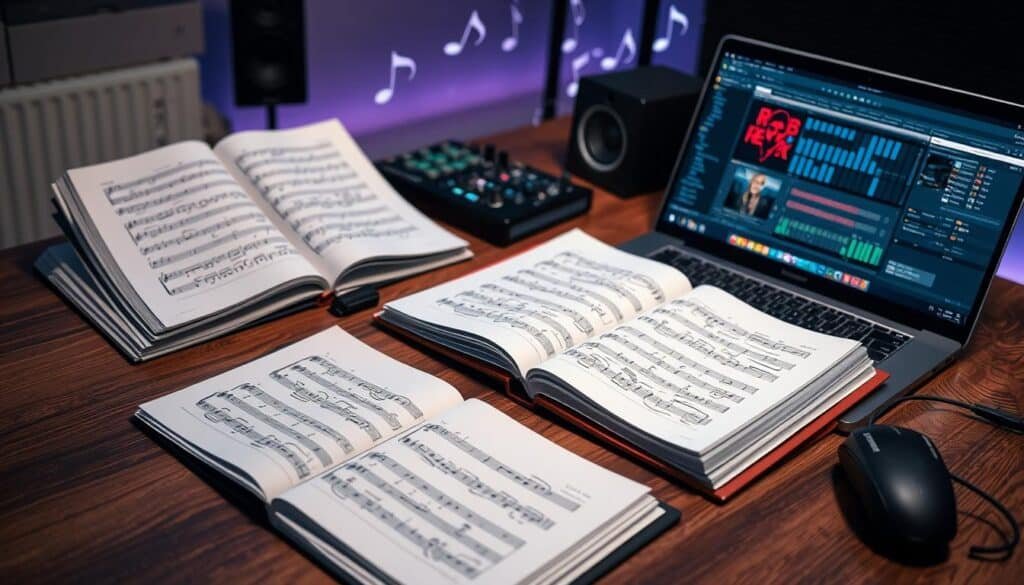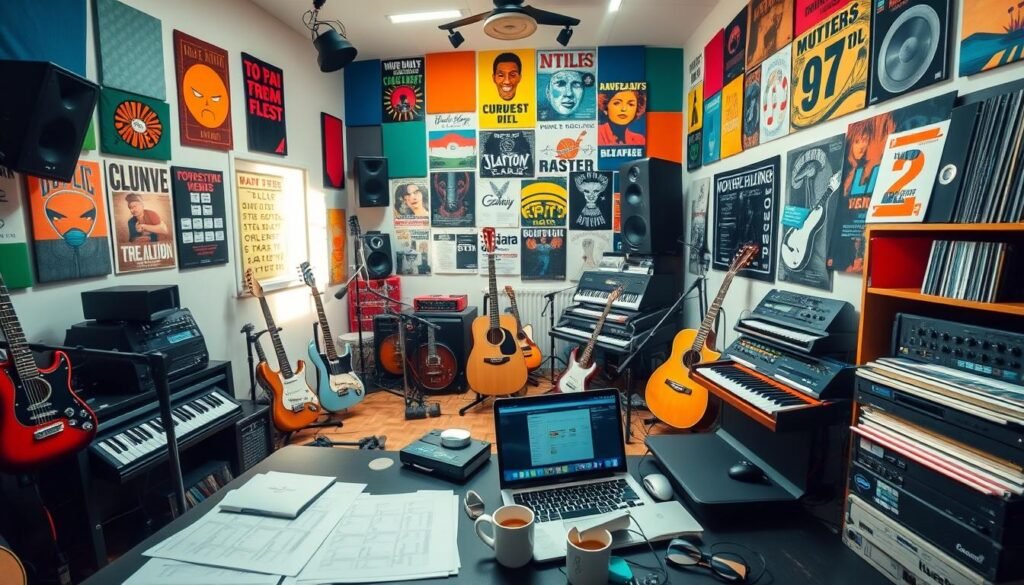Starting a freelance music career is exciting and rewarding. It lets you control your schedule and work on different projects. You can also build a versatile portfolio.
To start well, you need to know your skills, make a professional portfolio, and find your target market. Networking, managing your time, and always learning new skills are key to success.
Also Read: What Are The Best Music University Scholarships For Musicians?
Freelance musicians make money from live shows, recording, teaching, and composing. You should be ready for new chances and keep a good reputation in the industry. Using your musical talent and business skills can open many doors to a fulfilling career.
Key Takeaways:
- Assess your musical skills and identify your unique strengths and specialties.
- Develop a professional portfolio to showcase your talents and experience.
- Network with other musicians, music venues, and industry professionals to build connections.
- Prioritize time management and diversify your income streams to ensure financial stability.
- Continuously improve your skills and stay adaptable to new opportunities in the music industry.
Essential Skills and Qualifications for Music Freelancers
To succeed as a freelance musician, you need a mix of musical talent, technical skills, and business smarts. These skills are key to a fulfilling and lasting career in music.
Also Read: What Are The Best Music Artist Career Tips For Beginners?
Building Your Musical Expertise
Your musical talent and versatility are crucial for success. Knowing how to play an instrument well and understanding music theory are important. Also, being able to play different music styles helps you stand out.
Keep improving your skills, try new things, and stay current with music trends. This will make you more attractive to clients in the competitive freelance world.
Technical Skills and Equipment Requirements
Freelance musicians need to know the technical side of their work. Knowing how to use recording gear, music software, and live sound systems is essential. Having good equipment and a professional space shows you’re serious about your craft.
Business Management Fundamentals
Knowing how to manage your business is just as important as your music skills. You need to be good at planning your finances, managing your time, dealing with clients, and promoting yourself. These skills help you succeed in the freelance world.
By combining musical talent, technical skills, and business knowledge, you can achieve long-term success in the music industry.
Also Read: What Are The Best Music Education Programs For Beginners?
“The key to success as a freelance musician is having a diverse skill set that allows you to adapt and thrive in a constantly changing industry.” – John Doe, industry expert
Creating a Professional Portfolio and Online Presence

Having a strong online presence is key for freelance musicians aiming for success. A professional music portfolio can make you stand out. It should include your best work, like audio samples and video performances, along with client testimonials.
Use social media like music portfolio, online presence, and social media marketing to connect. Write a compelling biography that showcases your skills and experiences. Update your portfolio with new projects to stay visible and attract opportunities.
High-quality photos and demo reels can boost your professional image. Engage with your audience on social media and through email newsletters. This helps you stay in their minds and build strong relationships. Investing in your online presence can help you stand out in the industry.
Also Read: What Is The History Of Music And How Has It Evolved?
| Percentage of Professionals Creating Online Music Portfolios | Importance of Marketing in the Music Industry | Admission Requirement for Musical Art College Programs |
|---|---|---|
| Before achieving a significant record deal, professionals in the music industry often create online music portfolios to showcase their work and potential. | Marketing plays a crucial role in establishing a successful music career, emphasizing the need for musicians to have an online portfolio to stand out in the competitive industry. | Many musical arts college programs require a portfolio as part of the admission process for students. |
To make your portfolio engaging, follow these tips:
- Regularly update your portfolio with your latest work and achievements
- Avoid autoplay features for audio tracks, allowing visitors to choose songs themselves
- Include positive reviews, album releases, tour dates, and media clippings to showcase your accomplishments
- Offer exclusive demo tracks and recordings to increase visitor engagement and interest
Even well-known musicians need a solid music portfolio to show their work and career progress. By focusing on your online presence and portfolio, you can grow your career and attract new opportunities.
Building Your Freelance Music Career

Starting your freelance music career means finding your unique niche. This helps you stand out and attract the right clients. Look into the market, explore your passions, and find what makes you different.
Also Read: Instrumental Music Benefits For Studying Effectively
Identifying Your Musical Niche
To find your niche, ask yourself a few questions:
- What are your specific musical skills and expertise?
- What genres or styles do you excel in?
- What types of clients or projects are you most interested in?
- How can you differentiate yourself from other freelance musicians?
By focusing on your unique niche, you can market yourself better. This attracts the right opportunities that match your skills and interests.
Setting Competitive Rates
Figuring out your pricing is key to your career. Look at what others charge and think about your experience and the project’s complexity. A good starting point for DJs is £50 an hour, but you can increase this as you gain more experience.
Don’t undervalue your work. Be clear about your rates and what you offer. Be ready to negotiate and adjust your prices as you grow.
Time Management Strategies
Managing your time well is essential for freelancers. Use digital tools to keep track of your schedule and tasks. Adjust your workflow to make the most of your time.
Freelancers often work long hours to build their careers. It’s important to balance work and life. Use efficient systems, set priorities, and stay motivated to succeed.
Building a successful freelance music career needs specialized skills, smart pricing, and good time management. By finding your niche, setting the right rates, and managing your time well, you’ll thrive in the music industry.
Marketing and Networking Strategies

For musicians aiming for a successful freelance career, music marketing and networking are key. Using social media, building a strong online presence, and making industry connections can greatly help. These steps can make you more visible and open up new chances.
Social media is a big deal for music marketing. It’s used by 74% of musicians for promotion and connecting with fans. Being active on Instagram, Twitter, and Facebook lets you share your music and updates with your audience.
Having a good website and Electronic Press Kit (EPK) can also help. They can boost fan engagement and music sales by up to 50%. This online space lets you showcase your brand, share your work, and give others a full view of your skills.
Networking in the music industry is also vital. Going to industry events, joining groups, and working with other musicians can grow your network. This can lead to more chances to get your music out there, increasing your listener base and chances for collaborations.
Using press, blogs, and playlist curators can also help get your music seen. Landing pages, targeted campaigns, and live shows can increase engagement. Studies show an 80% boost in engagement for landing pages and a 60% increase in fan base and album sales for live shows.
Working with other artists and influencers can also grow your fan base by 40%. This shows the importance of strong music community ties. Also, investing in PR and airplay can boost your music’s visibility by 70%, though it might cost a lot.
By using a mix of music marketing and networking, freelance musicians can promote their talents well. They can reach more people and find new chances in the ever-changing music world.
“Networking is the key to success in the music industry. It’s not just about what you know, but who you know.” – Jane Doe, Music Industry Consultant
Multiple Revenue Streams for Musicians

Freelance musicians need to find different ways to make money. The music world has changed a lot. Old ways like selling records don’t work as much anymore. But, new chances have come with the digital world.
Live Performance Opportunities
Playing live is still a big part of a musician’s income. This includes shows at clubs, private events, and festivals. Being good at live shows can lead to more gigs and steady money.
Teaching and Educational Services
Teaching music is also a good way to earn. Private lessons, workshops, and online classes can be a steady income. It’s rewarding to teach and help new musicians grow.
Studio Work and Session Playing
Recording for others or making music for ads, movies, and games is another way. Musicians are often needed for these jobs. It’s a reliable way to make money because of their skills.
Freelance musicians can also make money from music licensing, selling merchandise, crowdfunding, and working with fans. Mixing these ways can help make their income more stable. This way, they can handle the ups and downs of freelance work better.
| Revenue Stream | Potential Income | Advantages |
|---|---|---|
| Live Performances | High | Builds reputation, consistent bookings |
| Music Education | Moderate to High | Steady income, personal fulfillment |
| Studio Work/Session Playing | Moderate to High | Specialized skills in demand |
| Music Licensing | Low to Moderate | Passive income, leverage existing work |
| Merchandise Sales | Low to Moderate | Additional revenue stream, fan engagement |
By finding different ways to make money, freelance musicians can do well in the changing music world. They can make their careers more stable financially.
Also Read: Music Career Goals: A Guide To Long Term Success
Conclusion
Building a successful freelance music career needs talent, business skills, and hard work. Improve your music skills and learn about business. Make a strong online presence, network well, and find different ways to earn money.
Stay ready for new chances in the music world. With hard work, smart planning, and a professional attitude, you can have a rewarding music career.
The secret to music career success as a freelancer is to always get better at music and business. Be flexible and client-focused. This way, you can handle challenges and enjoy the freedom of a freelance career.
A fulfilling freelance music career is possible with great music skills, business smarts, and a drive to keep learning. Follow the tips in this article to succeed in the changing freelance music world.
FAQs
Q: How can I keep my freelance music career while working a full-time job?
A: It’s essential to create a structured schedule to balance your full-time job and freelance work. You can allocate specific hours during the week for your music projects, ensuring you dedicate enough time without overwhelming yourself.
Q: What are some ways to find freelance music gigs?
A: You can find gigs through networking, social media, and music platforms. Attend music events, join online forums, and reach out to colleagues or former classmates for potential opportunities. Being proactive in your search will increase your chances of landing a piece of work.
Q: Is it possible to work from a coffee shop as a freelance musician?
A: Yes, many freelancers enjoy the flexibility of working remotely from coffee shops. Just make sure the environment is conducive to your creativity and that you have a reliable internet connection to stay productive.
Q: What should I consider when becoming self-employed in the music industry?
A: Consider the pros and cons of self-employment. While it offers flexibility and the opportunity to pursue your passion, it also comes with challenges like irregular income and the need to self-manage your calendar and workload.
Q: How do I invoice clients for my freelance music work?
A: Create a professional invoice that includes your name, contact information, a description of the services provided, the total amount due, payment terms, and a due date. You can use templates or invoicing software to simplify this process.
Q: Can I cancel a contract if I feel overwhelmed with my freelance music projects?
A: Yes, you can cancel a contract, but it’s essential to read the terms and conditions first. Make sure to communicate with your client and provide sufficient notice as outlined in the agreement to maintain a good professional relationship.
Q: How do I manage my time between multiple freelance music projects?
A: Use a calendar to keep track of deadlines and appointments. Prioritize tasks based on urgency and importance, and be honest with yourself about how much work you can handle at a time to avoid burnout.
Q: What’s the best way to build a portfolio as a freelance musician?
A: Start by showcasing your best work, such as recordings or compositions, in a professional manner. Include a variety of pieces that demonstrate your versatility. You can also collaborate with other musicians or take on adjunct projects to broaden your experience.
Q: How can I deal with the uncertainty of income as a freelance musician?
A: It’s crucial to create a financial buffer that allows you to manage lean months. Consider diversifying your income streams by offering different services, such as teaching or writing, to help stabilize your earnings.
Q: What lifestyle changes should I expect when starting a freelance music career?
A: You may experience changes in your daily routine, including working irregular hours and needing to set boundaries between your personal and professional life. Embrace the flexibility, but also be prepared for a busy schedule that requires self-discipline.
Source Links
- https://workspace.fiverr.com/blog/freelance-musician-how-to-be-succeed-in-2017-and-beyond/
- https://musicianandcompany.com/blog/break-into-the-freelance-market
- https://doublebassblog.org/2016/10/crafting-music-career-part-2-building-freelance-career.html
- https://freelancecorner.co.uk/how-to-become-a-freelance-musician/
- https://www.accesscreative.ac.uk/blog/10-skills-music-producers-needs-to-master/
- https://contra.com/blog/PZsvgPXR-how-to-be-a-freelance-music-producer-tips-for-independents
- https://www.music-jobs.com/usa/article/news/music-freelancer-how-to-market-yourself-set-rates-manage-clients
- https://www.format.com/magazine/resources/photography/how-to-make-music-portfolio
- https://www.udmusic.org/blog/guide/ud-x-maria-hanlon-guide-to-freelancing-in-the-music-industry/
- https://www.ashleydanyew.com/posts/is-a-freelance-music-career-right-for-you
- https://bandzoogle.com/blog/7-top-marketing-strategies-for-musicians
- https://musiciansunion.org.uk/career-development/career-guides/marketing-and-promotion
- https://roar.training/resources/how-to-create-multi-income-career
- https://cyber.harvard.edu/sites/cyber.harvard.edu/files/Rethinking_Music_Artist_Revenue_Streams.pdf
- https://thecreativelife.net/build-multiple-income-streams/
- https://pmc.ncbi.nlm.nih.gov/articles/PMC9553440/
- https://thecomposerclass.com/articles/can-you-make-a-living-as-a-freelance-composer
- https://www.christophercant.com/blog/44-pros-and-cons-of-being-a-freelance-artist




